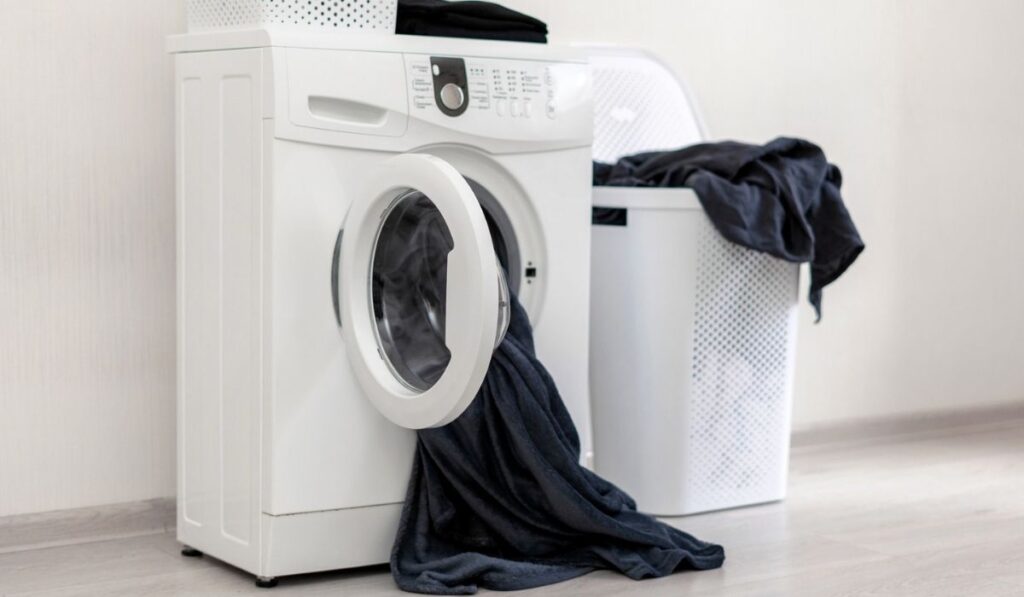Washing a comforter at home can be tricky due to the size and materials involved. But if you’ve got a down comforter, it can sometimes emerge from the wash with a damp or mildewy smell that isn’t exactly suitable for your bed. Don’t worry if this is the case; you’ve probably got the solution right in your pantry — vinegar.
Adding half a cup of white vinegar to a wash cycle can help remove the mildewy smell from your comforter, but you may need to do a second wash if the vinegar smell lingers afterward. A vinegar solution can also remove stains before you wash the comforter.
You may be surprised to hear that vinegar can be used to clean your comforter, but it’s a great alternative to laundry detergent that’s hypoallergenic, eco-friendly, and relatively cheap. Let’s look at how vinegar can be used to clean your comforter and some general tips for comforter care.
Can You Use Vinegar to Wash a Comforter?

You can use vinegar to wash your comforter as long as you’re careful and stick to the guidelines. For instance, before you start washing your comforter with vinegar, you need to decide what exactly you want the vinegar to do to your comforter.
Here are some of the many uses of vinegar when it comes to laundry:
- Brighten your comforter or reduce fading
- Soften tough comforters
- Remove nasty stains
- Remove soap from the comforter
- Remove mildew and odor from comforters
- Reduce static in your comforter
- Make your comforter feel like new
- General comforter washing
Although using vinegar in the washing machine is generally okay and won’t be harmful to the environment, you should be careful not to overdo it.
Using vinegar on a regular basis may cause damage to the rubber seals and hoses in your washing machine, eventually leading to leaks.
Therefore, although vinegar is good at washing and refreshing comforters, you need to use it in moderation to keep your washing machine functioning.
Benefits of Using Vinegar to Wash Clothes
Vinegar isn’t great only for removing mildewy smells from your comforter. Many people actually use vinegar as an alternative to classic laundry detergent. Here are a few of its advantages:
- Eco-Friendly: Unlike many laundry detergents that you’ll find out there, vinegar is a great all-natural option that won’t harm the environment — or you!
- Hypoallergenic: If you’ve got sensitive skin, vinegar is an ideal option. Many detergents contain harsh chemicals that can irritate sensitive skin, causing rashes.
- Deodorizing: Even though vinegar may not smell so great, it actually works to neutralize odors on clothing, such as those from smoke, pets, and sweat.
- Softens Fabric: Vinegar also works as a natural fabric softener that works just as well as the brand-name options you get at the store. It’ll also prevent static, so say goodbye to all that lint and pet hair that gathers on your clothing.
How to Wash a Comforter at Home
Before you actually set out to wash your comforter, it’s vital to gather the proper equipment. Here are some of the things that you’ll need:
- White wine vinegar (on Amazon)
- Mild or gentle laundry detergent (on Amazon)
- Washing machine
- Dryer
- Wool Dryer Balls (on Amazon)
Once you’ve got all you need, here’s how to wash your comforter at home:
1. Check the Care Label on Your Comforter
The first thing you should do is check if your comforter is machine washable or “dry clean only.” If it says dry clean only, you should consider taking it to a professional dry cleaner.
2. Check for Rips and Holes in Your Comforter
Before you wash your comforter, ensure that you check it for any rips and holes. A ripped comforter might not necessarily survive the wash. If there are any tears, fix them before loading your comforter into the washing machine.
3. Pre-Treat or Remove Any Stains on Your Comforter
For tough stains on your comforter, you can either pour a small amount onto the stain and let it soak or make a paste using a mixture of baking soda, water, and vinegar.
4. Choose the Best Washing Machine, Settings, and Detergent
Not all washing machines are designed in the same way, and they are not all fit for washing a comforter. Therefore, the washing machine you choose should have enough room to accommodate the comforter. You should also select a gentle or mild laundry detergent.
Some detergents have chemicals that can be harsh on your all-natural down comforter. Avoid using powdered detergent because it may not dissolve well in the washing machine. You can also use vinegar, as we mentioned above!
Furthermore, cold water is a safe bet if you aren’t sure about the water temperature setting.
5. Wash Your Comforter Thoroughly
Wash your comforter according to the care label instructions. If there are no instructions, choose warm or cool water and select the delicate or gentle cycle.
6. Check for Stains
You need to check if stains are still present on your comforter. If you find any, pre-treat and rewash your comforter. Keep repeating this step until all the stains are entirely removed.
7. Dry Your Comforter
While drying your comforter, it is a good idea to use wool dryer balls (on Amazon). This will assist in preventing clumping and fluffing of your comforter while it dries. The dryer balls also speed up the drying process, reducing the drying time.
Since your comforter is a bulky type of bedding, it’s vital to dry it well using low temperature and a delicate cycle. You should also periodically pause the dryer through the delicate cycle. You can shake out your comforter and turn it around for a more even drying process.
You should choose a dryer that is equipped to accommodate the size of your comforter. If you choose to air dry it, you will need to lay your comforter out on a drying rack for a few days.
This will ensure it’s entirely free of moisture. Once it’s completely dry, you can put it in the dryer with a few dryer balls to regain the fluff.
8. Check for Any Wet Spots
At the end of the dry cycle, you need to check if your comforter is fully dry. If it has any wet spots, repeat the dry cycle or lay your comforter flat to ensure that it’s fully dry.
Where Do You Put Vinegar in a Washing Machine?
In most cases, you should put vinegar or a mixture of water and vinegar directly into your washing machine as it fills with water and then add your comforter. You should avoid placing vinegar directly on your comforter unless it’s to treat stains.
Typically, you need to add a half-cup of vinegar to your washing machine during the last rinse cycle for regular comforter washing. You don’t have to worry about the lingering odor smell because the vinegar smell eventually goes away. If it doesn’t, you can do a second wash.
How Often Should You Wash a Comforter?

Sometimes, washing a bulky comforter can be a time-consuming and daunting task. Fortunately, comforters don’t need to be washed nearly often as sheets and other beddings.
How often you wash your comforter depends on several factors, such as personal preferences, lifestyle, and the material your comforter is made of.
Comforter washing experts suggest that you wash your comforter two or three times per year to keep them clean and fresh. However, there are exceptions to these suggestions.
For example, we all know that comforters can still get dirty and require good washing once in a while.
Besides, if you are prone to allergies or have a pet, such as a dog or a cat, that sleeps in your bed, you need to consider washing the comforter more often. This will help you avoid dust mites, dander, and other allergens.
Furthermore, it’s also recommended to wash your comforter after someone sick has been using it.
If you use a duvet cover along with a top sheet or a protective comforter, then the comforter will stay cleaner for a longer time because it’s not in direct contact with your body.
However, the comforter cover or duvet cover should be washed every week because it comes in direct contact with your skin. Also, to help you remember when to wash your comforter and stay consistent, it is recommended to wash your comforters when the seasons change.
